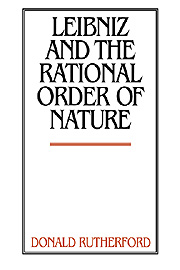Introduction
Published online by Cambridge University Press: 05 June 2012
Summary
A significant weakness of many modern studies of the philosophy of Gottfried Wilhelm Leibniz has been the negligible role they have assigned to the project of theodicy: his celebrated defense of God's justice as it is expressed in the creation of the best of all possible worlds.1 The reasons for this neglect are not hard to find. Present philosophical fashions inevitably dictate what we find to be of interest in the writings of historical figures. In our own century, particularly in the English-speaking world, an emphasis in philosophy on the topics of logic and mathematics has led us to focus on those parts of Leibniz's corpus (admittedly of the highest importance) that demonstrate similar concerns. In doing so, we have tended proportionally to neglect other aspects of his thought – most notably, his central theological commitments. We have all but forgotten that the only philosophical book Leibniz published during his life was the Essays on Theodicy. This tendency to overlook the doctrine of theodicy has been reinforced by a significant distortion of its contents. More often than not, Leibniz's position has come to be identified with the brand of simple-minded optimism that is satirized so effectively in Voltaire's Candide: Whatever happens, whatever evils may visit our lives, we may always take comfort in the thought that this is the best of all possible worlds. There is, however, little basis for this identification.
- Type
- Chapter
- Information
- Leibniz and the Rational Order of Nature , pp. 1 - 4Publisher: Cambridge University PressPrint publication year: 1995



